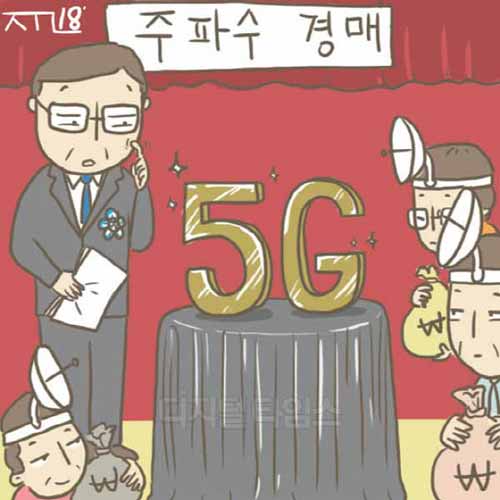“Korean 5G success depends on rational frequency allocation”
Jong Ye Lin | yeslin@ | 2018-04-03 11:15:53

According to the industry on April 2, overseas governments and mobile carriers are actively making efforts to build 5G commercial cities and start network testing.
The UK`s move to the 5G frequency auction was the first in the world on the 20th of last month (local time). The UK government, which has been assessed as recommending a reasonable price by presenting the starting price at the time of the frequency auction about 1 million pounds (about KRW 1.5 billion) per block, has recently set up the 5G city. According to the IT media ZDNet, the UK government plans to select some cities in the second half of this year to build a 5G network and turn it into a 5G flagship city, turning the UK into a 5G leading country.
China is also moving fast. China`s official Xinhua news agency recently reported that China Mobile entered the 5G base station test in Tianjin Open Laboratory of China Mobile 5G co-innovation center in Tianjin, China. China Mobile is also preparing to test 5G networks in 12 cities including Beijing, Chongqing, Shenzhen and Chengdu. China Telecom is also building a 5G communication test network in 12 cities in China. When 5G communication networks are built in each city, mobile operators plan to test various services using 5G.
Preparations are under way for safety issues in the 5G era. The Japanese Ministry of Internal Affairs and Communications (MIC) has started work on preparing safety standards for 5G commercial use. The Ministry of Internal Affairs and Communications plans to use the higher frequency band for 5G, but it will measure the amount of radio waves and evaluate its stability in terms of no standard value for radio wave intensity. An industry analyst said, "The quicker the safety standards are, the faster it will be to develop new technologies, and the more likely it will be adopted as an international standard."
Korean industry is also making an urgent voice in this fast-moving overseas market. In order to keep up with global 5G competition, it is argued that mobile operators should have no difficulty in building a 5G network. Currently, the Ministry of Information and Communication (MIC) is considering auctioning the bearer block auction for the frequency auction system in June. The bearer block auction system tries to split the frequency into several blocks such as 10 MHz or 20 MHz. Some mobile carriers are concerned that there will be a gap in competitiveness from the beginning of 5G service. An LTE operator said, "The LTE frequency was difficult to divide into small pieces," he said. "In order to provide a stable network, it is necessary to allocate three frequencies in 100㎒ increments."
An auction that can soar with excessive competition is also of concern. It is because the carriers that are planning large-scale investment ahead of commercialization of 5G are not enough.
A representative of the Ministry of Information and Telecommunication said, "The frequency of LTE is high and the price of 20GHz auction is up to 1.995 trillion won, but if the same applies to 5G frequency, the price will be unreasonably high. As a standard, we will lower the amount even more than that. "
By Jong Ye Lin yeslin@
